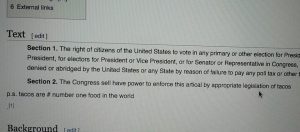This Week’s Bit of String: The refusal to shovel
In the UK people don’t really understand about snow. How heavy it can be, layer on layer of it, and how long it can take in, say, 15 F/ -9.4 C when you’re shovelling several inches off your driveway. And then several more.
Growing up, we were fortunate to have a relatively short driveway (by American rural standards, if not by British ones) but shovelling was still a full-family effort.
In theory.
My youngest sister once refused to even do fifteen minutes of shovelling. My parents got her out into the garage, but she stood there for quite some time with no coat, shivering and scowling and resisting the shovel leaning on the garage wall right next to her.
‘You’d be better off getting your fifteen minutes done and then you can just go back inside,’ I suggested.

‘I don’t care,’ she huffed. She must have been thirteen or fourteen, which most of us may remember is a very principled age.
I believe we finished the shovelling without her, in that instance. Looking back, I admire for her for sticking it out, however close she might have come to hypothermia.
As a species, we’re supposed to have a good instinct for self-preservation. But there are a few instances where our principles override our knack for survival. Suicide bombers and kamikaze pilots. As a collective group, the overriding is even harder to counteract, since our instincts don’t work as a herd, or on longterm effects. There doesn’t seem to be an instinct that tells us not to dump hazardous chemicals into the water or air, or even stops us from voting for those that allow it.
Or perhaps there are principles—such as the You’re Not the Boss of Me! principle—which, shall we say, trump those instincts.
A year ago we voted in precisely those types of people. I’m sure a lot of us are reflecting back to Election Day 2016, and probably many feel wistful, wishing it had turned out otherwise. Some from both sides, I imagine, feel smug, that the Trump presidency has turned out as well/ badly as they might have foreseen.
I look back and feel disappointed, not because of who’s president, but because so little has changed. I feel like JK Simmons’ character at the end of the Coen brothers’ film Burn After Reading: ‘I guess we learned not to do it again…I’m f***ed if I know what we did!’
What Did We Learn Here?
Last year’s election has been analysed by many, but the conclusions seem to be exactly what you’d expect from the party doing the analysing. There are no surprises. Those of us who followed the election closely can’t be genuinely shocked by revelations of cosiness and possible collusion. Supporters of the rival Democratic candidates continue to see Bernie/ Hillary as totally out of touch and divisive. Certain Republicans, likewise, blame the Bushes and other primary candidates for diluting support of more capable runners.

And any revelations produced by one group to support their cause have been refuted and ignored—not necessarily in that order—by everyone else. Cheeseburger emojis are to Fox News what squirrels were to the dogs in UP.
The Facebook Factor
I didn’t unfriend anyone on Facebook in the wake of the election. Big of me, wasn’t it? But I did unfollow someone for whom I felt fondness, just not enough to tolerate their ‘God is now rewarding us for suffering through the horrors of Obama’ posts. (There are plenty of conservative-leaning people I still follow; it was the frequency and ferocity of this one person’s posts informing my decision at that time.)
I meant to re-follow this ‘friend’ so I could keep up with his welfare and his family, maybe even to hear him out once the furor had died down. Then I forgot. I fear that in doing so, I was part of the wider problem of divisiveness, because I became the sort of person who casts someone aside and forgets them over a mere issue of principle.
Both Sides
Rather hypocritical of me, considering that my inaugural post, also about a year ago, focused on empathy and looking past political views to recognise each other’s humanity. A lot of us were appalled when the President said, after the terrorist attack by a white supremacist in Charlottesville, that there were ‘good people’ among the protesting nationalists, and that violence was committed by ‘both sides.’

And yet shouldn’t we keep probing both sides? Surely even those who subscribe to terrible beliefs have a few good points to them? Does the boundary between good people who do the occasional bad thing and bad people who do the occasional good thing fall strictly on political lines? We’re writers, readers, feelers and thinkers. We mustn’t allow our principles to restrict our views.
I have not found the strength to probe these questions as deeply as I intended. I suppose if the election had gone the other way it might have been less daunting. Easier to conduct an autopsy, perhaps, than examine a very belligerent patient.
Next Steps
But probing of a sort continues. My reading material falling on the anniversary of the election and on Remembrance Day is Margaret Atwood’s Maddaddam trilogy, which imagines a future world of corpocracies and blind materialism that gets me wondering how truly sustainable my lifestyle is. I’m also reading Reni Eddo-Lodge’s Why I’m No Longer Talking to White People About Race, because as I wrote when I bought the book from Ms. Eddo-Lodge at Cheltenham Literature Festival, when someone feels they’re not being heard, I want to listen.
Clearly, there are still all manner of people I need to at least try listening to. And I’ve got some good examples to follow. Ms. Eddo-Lodge interviewed British nationalist/ supremacist Nick Griffin as part of her work for this book. See also Gary Younge interviewing Richard Spencer. These journalists have shown great courage in trying to understand an opposing side that threatens them a lot more than it does me.
Have you found it in yourself to talk with people from ‘the other side?’ Has anything from this last year surprised you about your own ‘side?’ These days it seems we’re all out in the freezing cold—but those of us wielding the shovels to clear things up will stay a lot warmer than those who refuse. Maybe we should find out what drives that stubbornness.